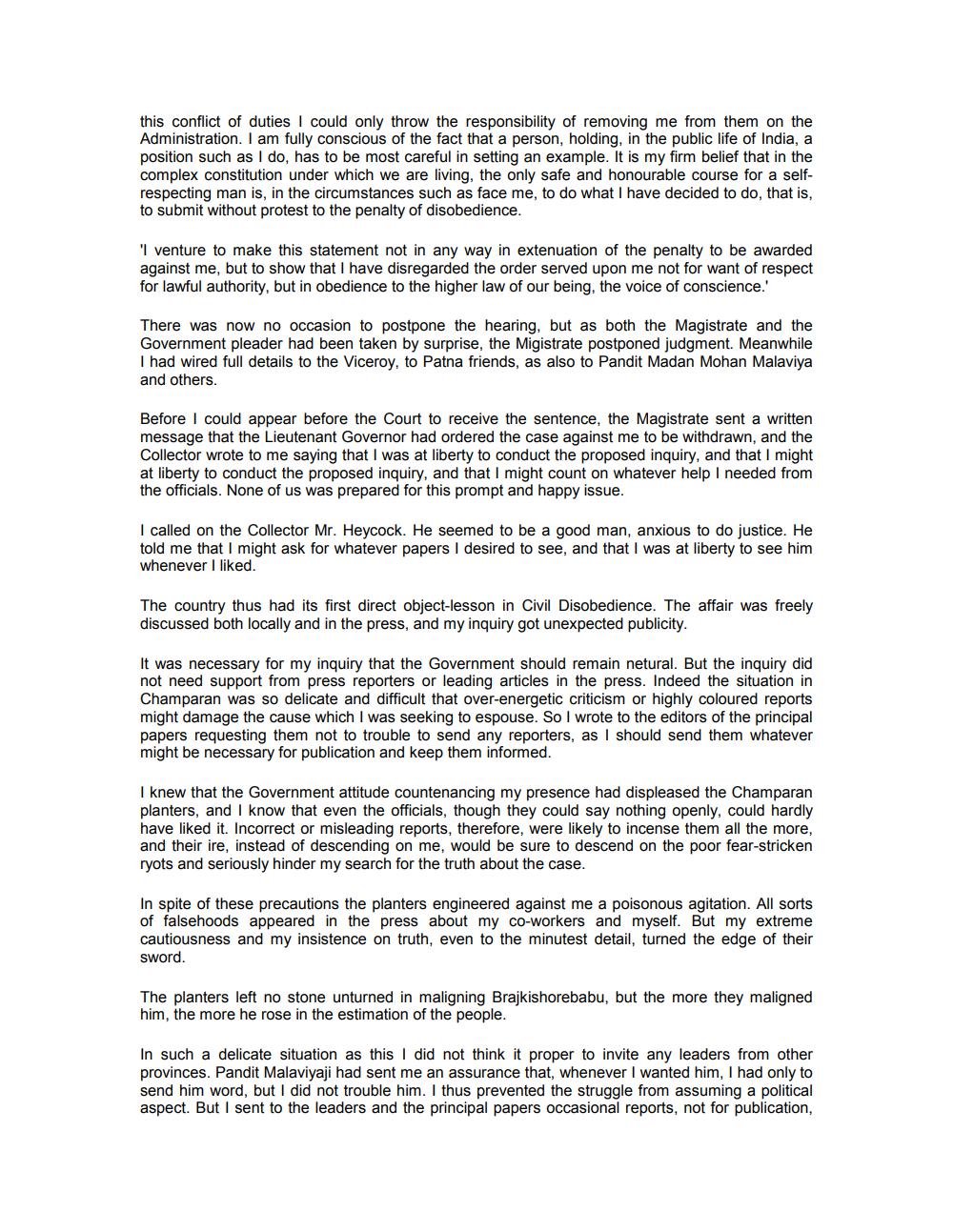________________
this conflict of duties I could only throw the responsibility of removing me from them on the Administration. I am fully conscious of the fact that a person, holding, in the public life of India, a position such as I do, has to be most careful in setting an example. It is my firm belief that in the complex constitution under which we are living, the only safe and honourable course for a selfrespecting man is, in the circumstances such as face me, to do what I have decided to do, that is, to submit without protest to the penalty of disobedience.
'l venture to make this statement not in any way in extenuation of the penalty to be awarded against me, but to show that I have disregarded the order served upon me not for want of respect for lawful authority, but in obedience to the higher law of our being, the voice of conscience.'
There was now no occasion to postpone the hearing, but as both the Magistrate and the Government pleader had been taken by surprise, the Migistrate postponed judgment. Meanwhile I had wired full details to the Viceroy, to Patna friends, as also to Pandit Madan Mohan Malaviya and others.
Before I could appear before the Court to receive the sentence, the Magistrate sent a written message that the Lieutenant Governor had ordered the case against me to be withdrawn, and the Collector wrote to me saying that I was at liberty to conduct the proposed inquiry, and that I might at liberty to conduct the proposed inquiry, and that I might count on whatever help I needed from the officials. None of us was prepared for this prompt and happy issue.
I called on the Collector Mr. Heycock. He seemed to be a good man, anxious to do justice. He told me that I might ask for whatever papers | desired to see, and that I was at liberty to see him whenever I liked.
The country thus had its first direct object-lesson in Civil Disobedience. The affair was freely discussed both locally and in the press, and my inquiry got unexpected publicity.
It was necessary for my inquiry that the Government should remain netural. But the inquiry did not need support from press reporters or leading articles in the press. Indeed the situation in Champaran was so delicate and difficult that over-energetic criticism or highly coloured reports might damage the cause which I was seeking to espouse. So I wrote to the editors of the principal papers requesting them not to trouble to send any reporters, as I should send them whatever might be necessary for publication and keep them informed.
I knew that the Government attitude countenancing my presence had displeased the Champaran planters, and I know that even the officials, though they could say nothing openly, could hardly have liked it. Incorrect or misleading reports, therefore, were likely to incense them all the more, and their ire, instead of descending on me, would be sure to descend on the poor fear-stricken ryots and seriously hinder my search for the truth about the case.
In spite of these precautions the planters engineered against me a poisonous agitation. All sorts of falsehoods appeared in the press about my co-workers and myself. But my extreme cautiousness and my insistence on truth, even to the minutest detail, turned the edge of their sword.
The planters left no stone unturned in maligning Brajkishorebabu, but the more they maligned him, the more he rose in the estimation of the people.
In such a delicate situation as this I did not think it proper to invite any leaders from other provinces. Pandit Malaviyaji had sent me an assurance that, whenever I wanted him, I had only to send him word, but I did not trouble him. I thus prevented the struggle from assuming a political aspect. But I sent to the leaders and the principal papers occasional reports, not for publication,




